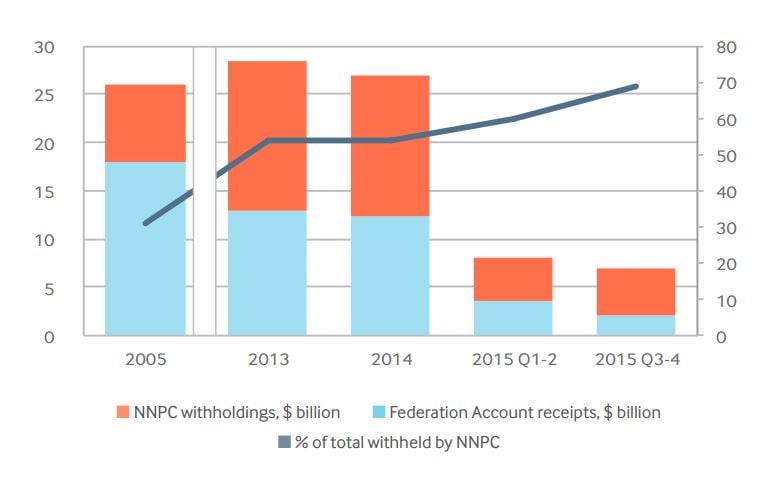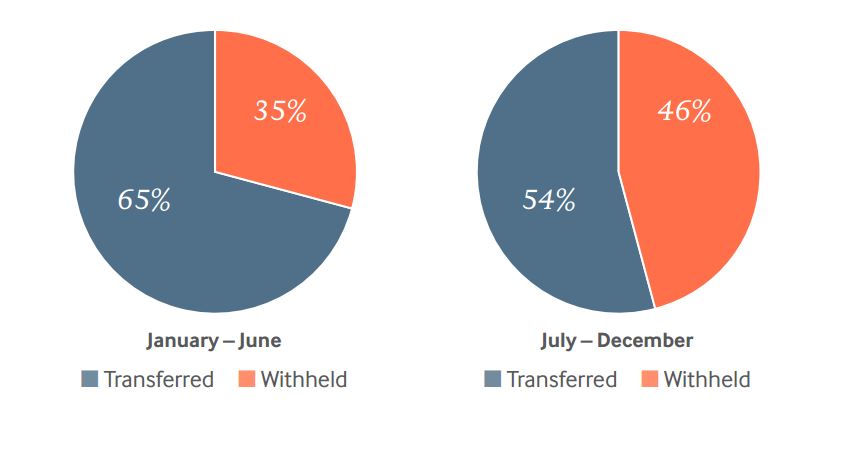According to a report by the National Resource Governance Institute (NGRI), an international non-profit policy institute with focus on oil, gas and minerals, NNPC withheld more in the last six months of 2015 than in the first six.
“Under the Buhari government, transfers from NNPC’s convoluted oil sales system to the Federation Account have continued to decline,” the report read.
“After analyzing NNPC’s own numbers, we estimate that during the last six months of 2015, the corporation transferred $2.1 billion in oil proceeds to the Federation Account from the three types of oil sales we examined: regular export sales, domestic crude sales, and sales of oil from NPDC fields.
“During that same period, however, the value of these sales totaled $6.3 billion. In other words, under the Buhari government, only one third of NNPC’s oil sale revenues found their way into the country’s treasury.
“The figures show that NNPC retained $4.2 billion in the last six months of 2016, 14 percent more than what was withheld in (Goodluck) Jonathan’s last days as president.
“NNPC reported retaining $4.2 billion—or 66 percent—of the value of the oil sold through these three types of transactions.
“As seen in the figures below, this was 14 percent more than the corporation’s withholdings under Goodluck Jonathan in the first half of 2015, and 12 percent higher than the share withheld in 2013 and 2014.
“Go back a decade, and the numbers nearly flip: in 2005, NNPC sent 68 percent of its oil sale earnings to the Federation Account and kept only 32 percent.”
The report, which was compiled based on NEITI financial audit reports, NNPC financial reports, and NRGI’s investigations, revealed that NNPC withheld 52%, 52% and 59% of its revenue in 2013, 2014 and 2015 respectively.
WHERE DOES THE MONEY GO?
NRGI did not stop its research on how much was retained by the NNPC, but takes the process further to unveil tentative locations where the monies end up.According to the report, some of the monies are used to pay outstanding joint venture debts, refineries, and the rest to NPDC which it referred to as “one of the Nigerian petroleum sector’s great black boxes”.
“The subsidiary (NPDC) produced a sizeable 110,000 barrels of oil per day in the last six months of 2015.14 But we have seen no evidence that proceeds from NPDC oil sales enter the treasury.
“Instead, they are spent in an unknown manner. In one especially questionable case, we found evidence that NNPC has retained all earnings from the offshore Oil Mining Lease (OML) 119, a field owned wholly by NPDC that produces around 30,000 barrels per day of Okono grade crude.”
These revelations have called Buhari’s fiscal responsibility message to question, with NRGI saying “corruption aside, allocating $4.2 billion in six months to NNPC expenses of unknown priority raises serious questions about fiscal responsibility”.
NNPC ACT AND CONSTITUTION AT LOGGERHEADS
Recommending probable solutions to the president, NRGI said “clarifying the financial relationship between NNPC and the state may be the single most important component of the Buhari administration’s oil sector reform campaign”.The report further recommends that a “longstanding misalignment” between the NNPC Act of 1977 and the 1999 constitution “leaves this money in legal limbo”.
NRGI seeks that “the government should put in place a clear, legally enforceable rule governing which revenues NNPC can keep”.
NRGI commended Buhari and his team for clearly working towards a cleaner oil sector, stating that much of its focus has been limited to replacing unethical officials and tracking stolen funds.
“The leadership can build on gains made to date by clarifying the financial relationship between NNPC and the state,” it concluded.
credit the cable


No comments:
Post a Comment